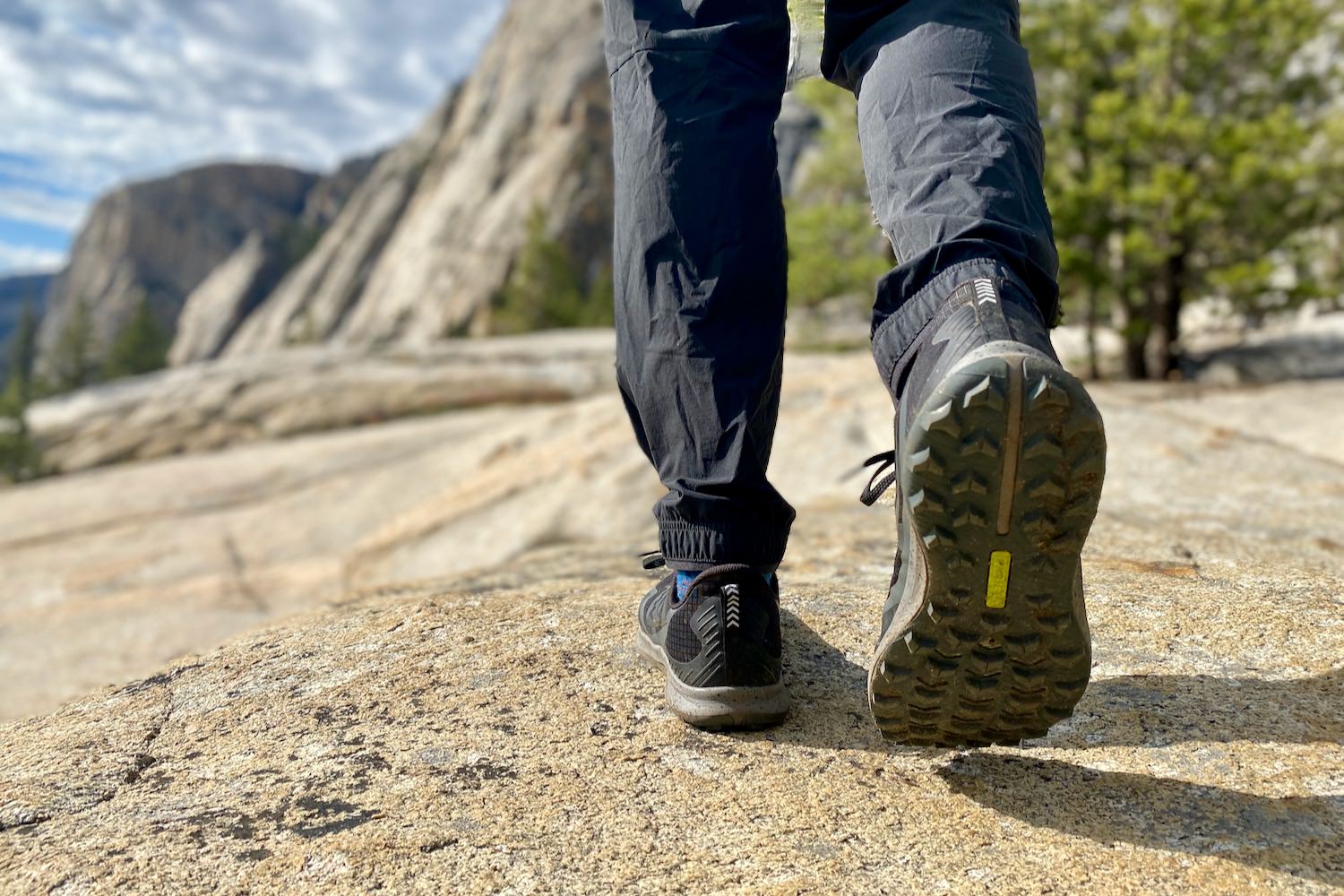
Selecting the proper pair of mountaineering boots or sneakers could be overwhelming – there are lots of choices on your ft.
When contemplating any mountaineering boot, the soles are one of the crucial essential components to grasp. Tread patterns, supplies, and design can outline your efficiency, security, and luxury within the backcountry. Climbing boot soles are extra than simply the rubbery elements below your ft – they’re the distinction between an fulfilling outing and severe foot ache.
Whether or not your adventures take you thru rugged landscapes, sandy paths, snowy summits, or muddy forests, the underside of your sneakers matter. On this information, we clarify how totally different tread patterns are designed for various terrains and aid you select the perfect shoe on your subsequent hike.
The Fundamentals of Climbing Boot Soles
THE SOLE’S ROLE
Your mountaineering boot sole is the interface between your ft and the path. It prevents damage to your foot from sharp rocks, branches, and different mountaineering hazards. The soles present essential help by distributing your weight evenly throughout the foot to keep away from strain factors, scale back discomfort, and preserve you balanced. An environment friendly sole design may even preserve your vitality: by preserving you snug and steady by way of difficult terrain, you’re much less vulnerable to fatigue throughout lengthy hikes.
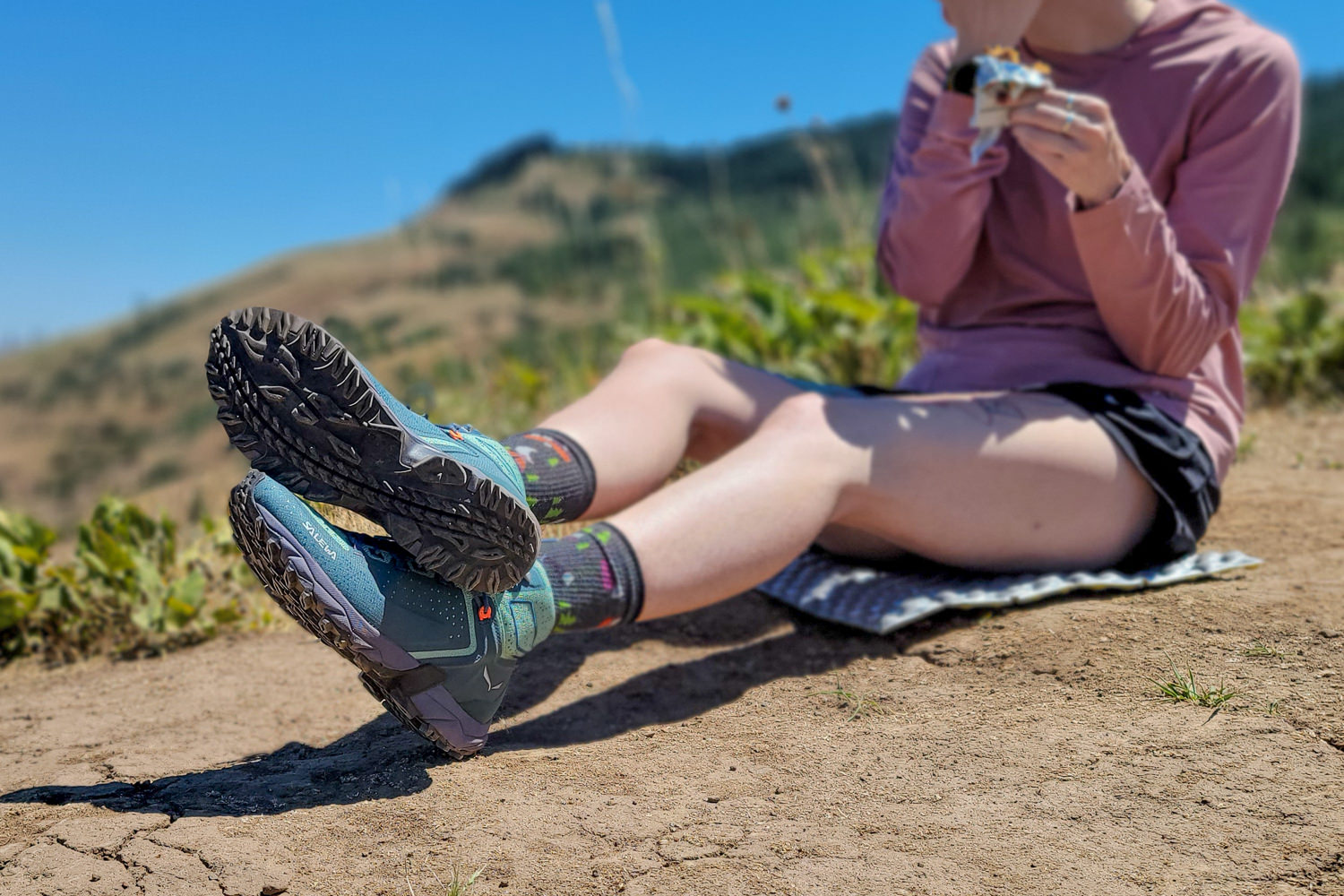
HOW HIKING BOOTS ARE BUILT
Climbing sneakers are divided into two elements: the higher, and the only real. The higher of a mountaineering boot is the half that covers the perimeters and prime of your foot, and in some instances, it might lengthen to the ankle.
The soles are the bottom of the shoe and are divided into three layers:
Outsole – The outsole is the seen a part of the shoe on the underside, the place the knobs of the tread contact the bottom. This layer is usually made of specialised rubber blends and determines how versatile or stiff your complete sole might be. The outsole is lined with lugs in a sure sample, which determines traction, grip, stability, and sturdiness whereas mountaineering.
Midsole – The midsole is sandwiched between the insole and outsole, and is often constructed of agency, processed foam, mushy rubber, and plastic blends, however will also be product of gels or stuffed with air for further consolation. The midsole is the first cushioning layer, very important for absorbing impacts whereas preserving you balanced. It’s additionally answerable for how gentle or heavy the shoe is. For instance, a path runner’s midsole is lighter as a result of it’s often stuffed with foam for nimble motion. Conversely, mountaineering boots use heavier, insulating foam for stability and heat. The midsole also can assist with temperature management since breathable supplies can improve airflow and assist the higher shoe get rid of sweat.
Insole – The insole is also referred to as the footbed. That is the half your foot touches instantly. This skinny layer is often product of a hybrid textile materials and provides cushioning and help on prime of the midsole. The insole also can assist preserve your really feel just a bit much less sweaty.
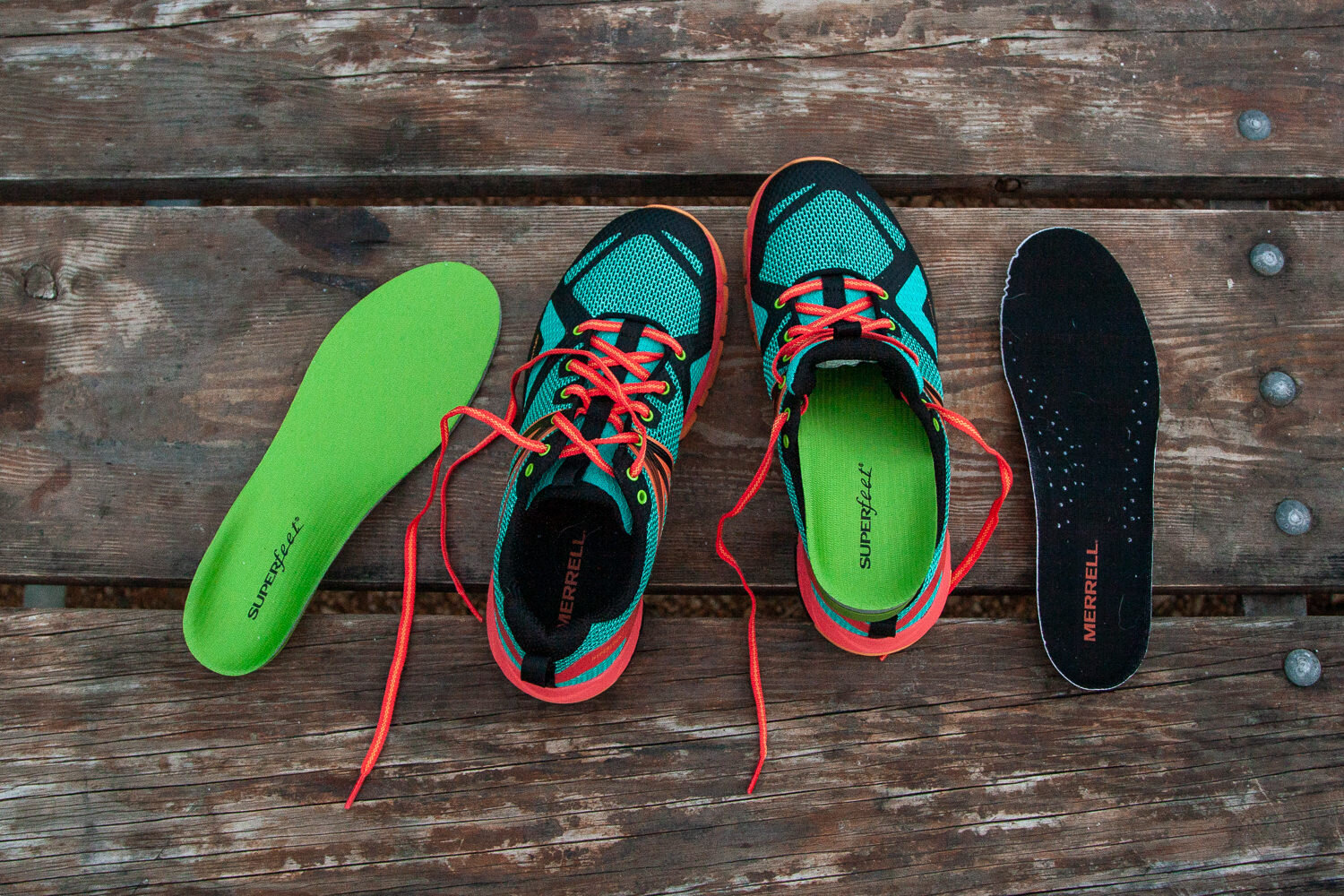
GRIP & TRACTION
Grip is a strategy to describe how nicely a mountaineering sole maintains contact with the bottom. The extra contact your shoe has with the bottom, the much less seemingly you might be to misstep or fall. A great grip permits you to hike with management in each step.
Traction is how successfully a mountaineering sole resists slipping. It’s the results of the only real’s design – like lug form and positioning, the flexibleness of the outsole, and its total form – interacting with the floor of the bottom. A sole with excellent traction will chunk into an incline to forestall slippage.
The proper sample and lug mixture are what give your soles grip and traction. A shoe with each will aid you crush steep ascents or descents, keep agile by way of jagged trails, and transfer confidently on moist routes.
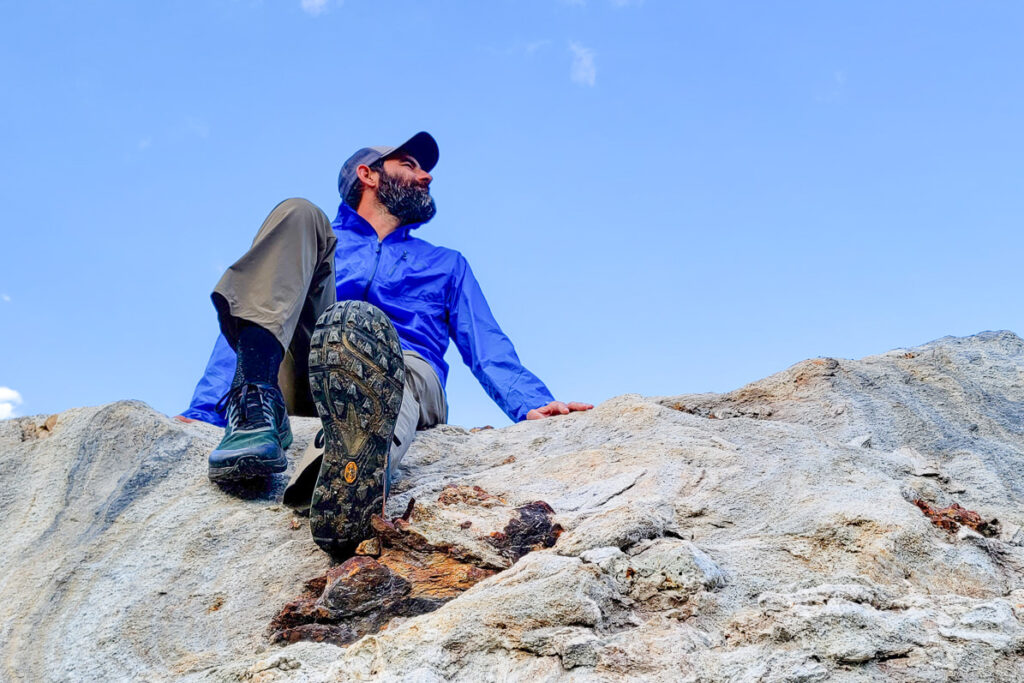
SHOES FOR YOUR TERRAIN
Climbing in numerous terrains poses distinctive dangers. In a muddy place, you may be vulnerable to slipping and falling. In a dry, desert local weather, you may be vulnerable to blisters from sizzling ft. Think about the time of yr and present circumstances of your mountaineering vacation spot: can your shoe stand up to prolonged publicity to snow, mud, excessive temperatures, and water? Understanding the terrain, climate, and circumstances the place you’re going is important. Choosing the proper sneakers on your surroundings is safer, extra snug, and will increase the possibilities you’ll get the place you’re going, and arrive in a very good temper.
That’s why mountaineering footwear is designed with terrain-specific options. For instance, mountaineering boots meant for rocky terrain usually function protecting toe caps, ankle safety, and aggressive lugs, whereas sneakers developed for wetter locations have waterproof linings, versatile soles, and extra intricate tread patterns. You may be mountaineering in a location with many drastically totally different circumstances, so search for a boot designed to deal with all of it. Similar to you wouldn’t take a Prius on a 4WD street, or an ATV on a freeway, your mountaineering shoe ought to match the panorama the place you’re enjoying.
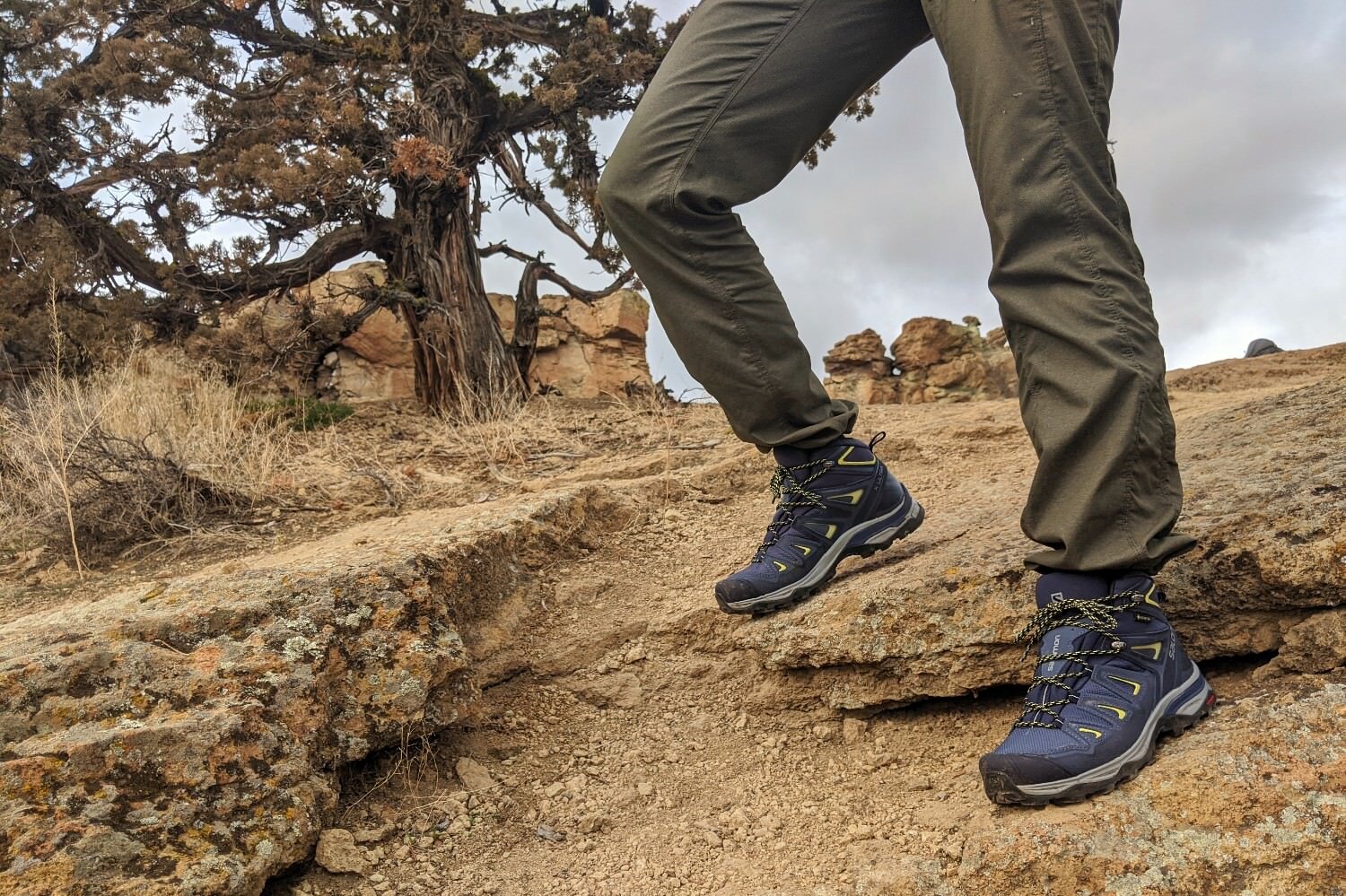
Manufacturers of Climbing Boot Soles
Only a handful of manufacturers are answerable for many of the outsoles and midsoles you’ll discover in your footwear:
Vibram – Vibram has develop into a juggernaut within the out of doors footwear sole {industry} during the last 90+ years due to its collaborations with dozens of corporations world wide. They’ve had a hand (or…foot?) in co-creating among the hottest and sturdy soles and sneakers in trendy historical past. Vibram soles are broadly identified for modern lug patterns and customized rubber compounds constructed round particular and different terrains.
Today, you’ll discover Vibram soles on all the things from sandals and light-weight path runners to burly mountaineering sneakers and rugged mountaineering boots. The listing of manufacturers that Vibram provides is just too lengthy to listing right here, however some family names embody La Sportiva, Nike, and Merrell. Try their full listing of partnerships.
Michelin – Sure, the automobile tire firm – additionally works with mountaineering boot manufacturers to create high-performance outsoles. Michelin soles function a novel rubber compound and tread sample impressed by their past love: tire expertise. These soles focus on grip for moist, rocky, and muddy surfaces. Salewa, Garmont, and Arc’teryx use Michelin rubber blends on mountaineering boots, method sneakers, and mountaineering boots.
Gore-Tex – This well-known title is related extra with waterproof and breathable supplies than boot soles. However so many mountaineering manufacturers make the most of their membranes, we’d be remiss to not embody the model. Gore-Tex tech makes use of a microporous membrane with pores smaller than water droplets, however bigger than water vapor molecules. When utilized in sneakers, this implies sweat can dissipate whereas stopping water from getting into, making them optimum for sneakers and boots utilized in moist, muddy, and snowy circumstances.
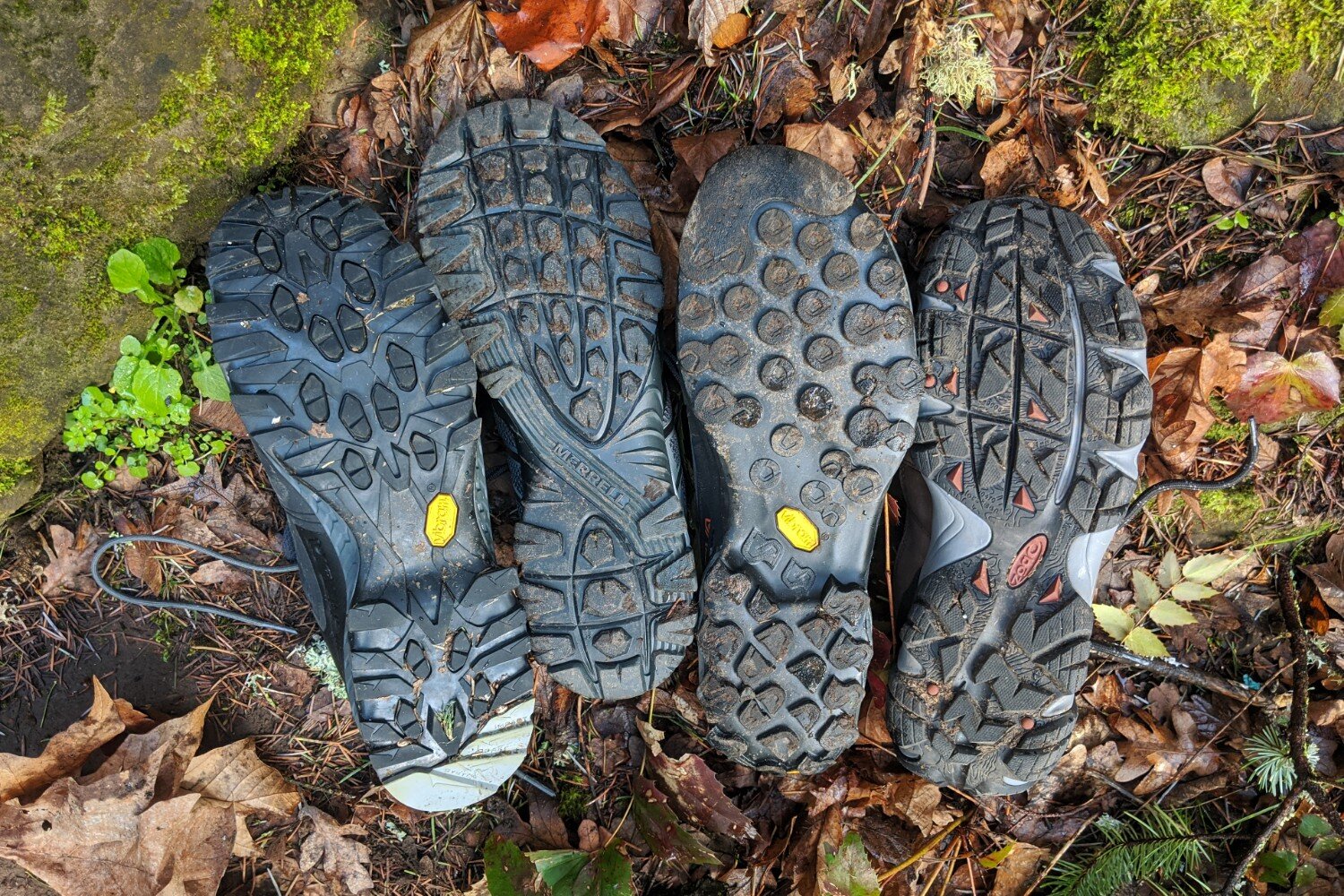
Boot Manufacturers with Their Personal Soles
Lots of the hottest and famend mountaineering footwear corporations make their very own branded mountaineering soles. Every sole has its personal title, particular mix of rubber and foam, a distinct segment terrain or use, and distinctive advertising. Understand that as a result of these corporations produce their very own rubber blends, these merchandise usually come at a better price ticket. Relying on the mix, many boots and sneakers can require lengthy break-in intervals. And, merchandise are sometimes designed to have particular makes use of that could be too area of interest for an off-the-cuff hiker.
Listed here are a couple of fashionable shoe manufacturers with customized soles which might be particular to their model:
Impression Brake System, La Sportiva – La Sportiva received its begin as a climbing firm however has developed fashionable, distinctive soles for its mountaineering and mountaineering footwear. Its soles supply glorious traction, consolation, and precision for discerning hikers. The Impression Brake System is a tread design that makes use of stiff rubber on the perimeters of the only real, and sometimes stickier, softer rubber on the middle, to assist with grip on each steep ascents and unfastened descents.
Contagrip, Salomon – Solomon is understood for constructing versatile, sturdy mountaineering footwear. The corporate’s proprietary sole design is named Contagrip. It’s comprised of 5 totally different rubber mix and lug sample combos, every designed for a selected use: street, all-terrain, mud, winter, and water. Contagrip provides industry-leading traction and efficient composite blends, and Solomon makes use of these outsole designs on all the things from gentle path runners to their winter boots. The Males’s Salomon X Extremely 4 GTX and Males’s Salomon Quest 4 GTX are a few of our favorites. Notably, each boots function Contagrip outsoles.
Omni-Grip, Columbia Sportswear – Columbia’s model of rubber is named Omni-Grip. It’s designed as an all-terrain tread and rubber mix for elevated efficiency in moist or dry circumstances and all landscapes from rock to grime. It’s a general-use traction system for versatility in cross-country, multi-zone adventures. Omni-Grip helps make Columbia sneakers really feel snug and steady in most landscapes. Each the Columbia Fairbanks Omni-Warmth and Columbia Minx Shorty 3 function Omni-Grip outsoles, and they’re one among our favorites on our best-of gear lists for each males and ladies.
Granite Peak & Sawtooth, Oboz – Oboz are famend for his or her consolation and help. The Granite Peak and Sawtooth outsoles share their names with the sneakers they’re used on. This tread design and rubber composite is just not solely made for sturdiness and grip on all kinds of terrain but it surely’s additionally very supportive.
M Choose Grip, Merrell – Merrell’s soles are referred to as M Choose, however this branding covers all kinds of their merchandise together with garments and footwear. There are particular and totally different M Choose designs used of their versatile path runners and waterproof footwear which might be tailor-made for moist, muddy, and icy terrain. Merrell repeatedly collaborates with Vibram and Gore-Tex on their sneakers.
Elika Rubber, Lowa – Lowa boots use a mixture of proprietary rubber composites and Vibram for the tread on their mountaineering boots. Lowa is a pacesetter in mountaineering footwear for all the things from mellow day hikes to multi-day mountaineering adventures. Elika rubber reveals up totally on their all-terrain fashions and provides a geometrical lug design to make their boot soles cheesy, sturdy, and steady for moist or dry circumstances.
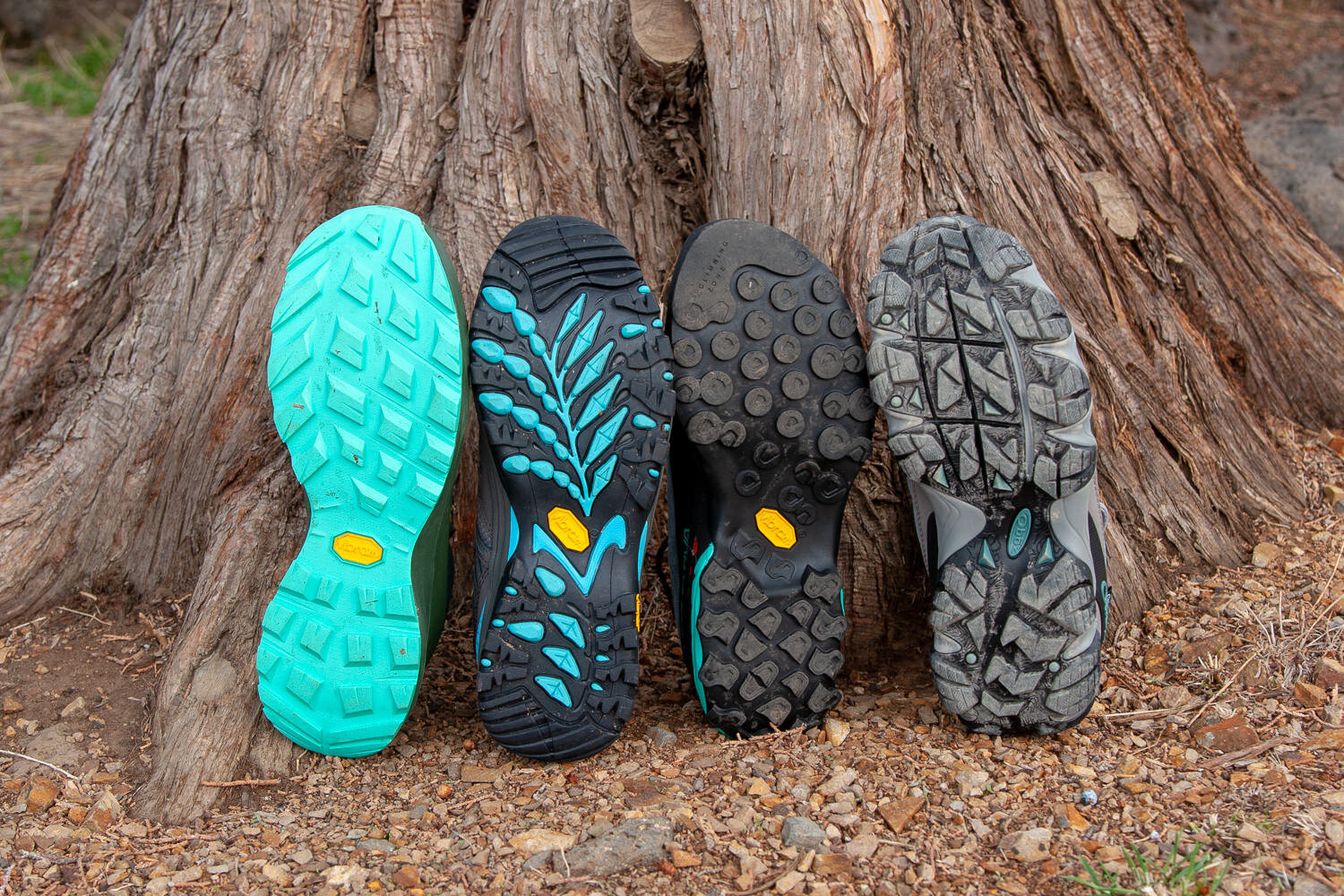
Elements to Think about When Selecting Climbing Boot Soles
FLEXIBILITY VS. STIFFNESS
Selecting between flexibility and stiffness in your subsequent pair of mountaineering shoe soles relies on the place you’re touring, but it surely additionally comes down to private desire.
You may lean in the direction of extra versatile and stickier soles in the event you’re masking plenty of miles on maintained trails with mild to medium slopes. Typically, versatile and softer rubber compounds present higher traction on totally different surfaces. Inflexible soles nonetheless present glorious traction, however usually the rubber is much less versatile and fewer sticky in favor of sturdiness and help.
Flexibility is:
- Good for hikers with smaller pack masses and a decrease physique weight. For instance, skilled ultralight backpackers are likely to favor softer soles like these in versatile mountaineering sneakers and path runners, since they’re usually extra snug for long-distance mountaineering. It’s very uncommon to satisfy a thru-hiker mountaineering in stiff boots. Versatile soles use extra foam and fewer rubber composite, in order that they are typically lighter.
- For those who worth agility, much less break-in time, and like path operating or quick mountaineering, versatile mountaineering sneakers like path runners can supply the velocity you’re in search of.
- Unhealthy for hikers who want extra help and stability since versatile soles should not as efficient with a heavy backpack. Comfortable soles can result in foot fatigue and damage. Versatile soles are additionally much less sturdy in tough circumstances. Comfortable rubber and foam means quicker put on and tear.
A stiffer sole is usually higher for technical mountaineering and mountaineering, the place your ft endure steep slopes and rugged terrain.
- Good for bigger physique sorts and heavier backpacking masses, a agency sole can supply extra help and stability on irregular floor. Think about that mountaineering boots with stiffer soles usually include greater, extra sturdy ankle help, which will help stop sprains and damage. As a result of inflexible soles are constructed with stronger supplies, they higher defend in opposition to rocks and roots.
- Extremely technical climbing sneakers and severe mountaineering boots have stiffer soles for superior edge help, excessive efficiency on steep inclines, and sturdiness in harsh circumstances.
- Stiff soles can have an extended break-in interval, resulting in blisters and foot ache, particularly on lengthy hikes or flat trails. Stiff soles additionally restrict agility. They are typically heavier and restrict the pure flexibility of the ankle and toes.
Except you spend nearly all of your mountaineering time in a selected sort of terrain, a shoe with a sole that strikes a steadiness between flexibility and stiffness is what most individuals are in search of. For our prime suggestions, take a look at our lists of Greatest Climbing Boots and Greatest Climbing Sneakers.
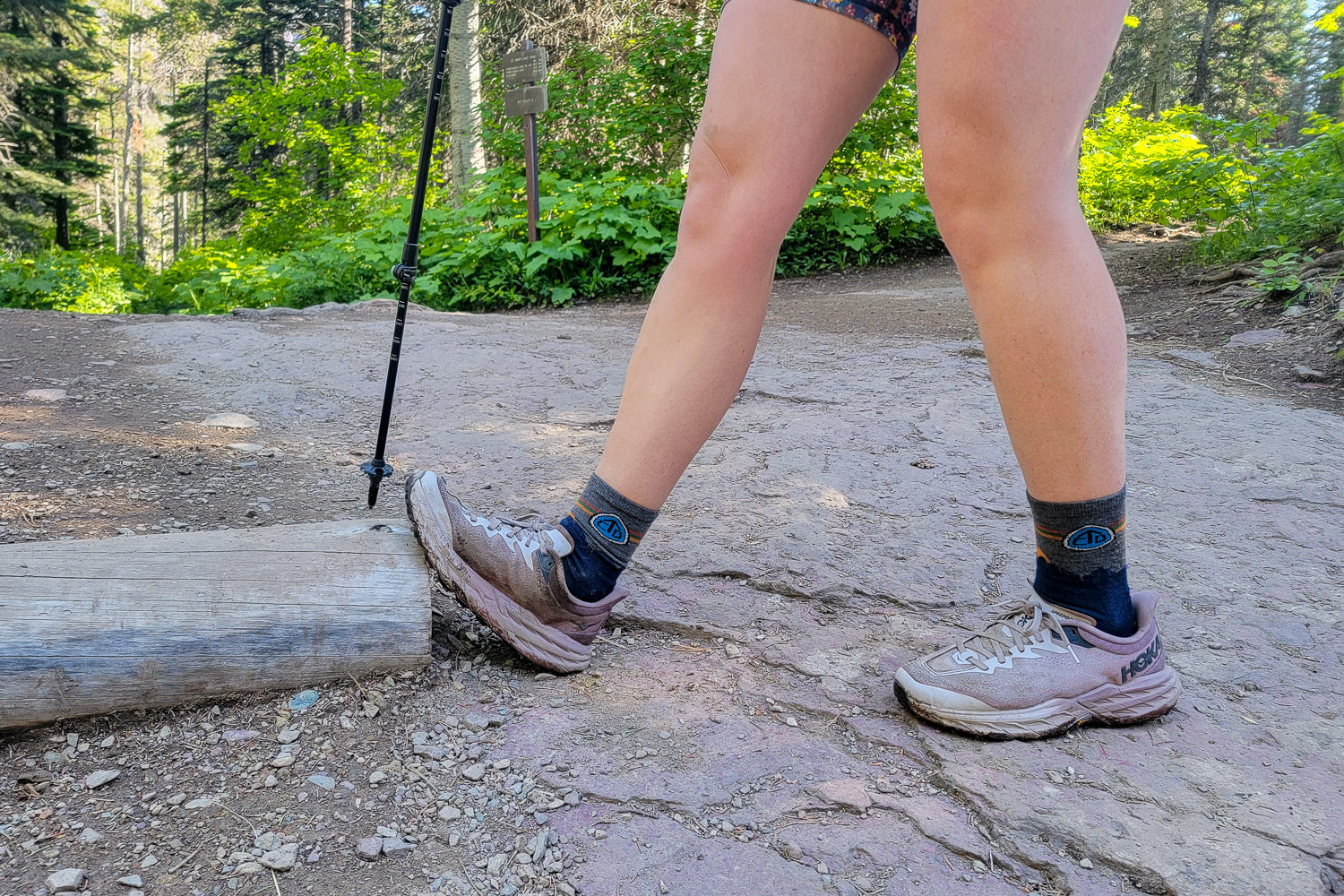
LUG PATTERN
Lugs are the raised, protruding bumps that make up the sample in your mountaineering sole. They arrive in all shapes and depths. The proper sample and lug mixture will help you sort out difficult ascents or descents, jagged and rocky trails, or moist and slick routes with ease. For muddy and moist areas, lug patterns are sometimes designed to be self-cleaning. These are tread designs that direct water away from the shoe and shed mud and gravel as you stroll to maximise grip. A wise lug sample additionally distributes weight evenly, so strain is utilized to many lugs without delay.
Designers strategically organize lugs, grooves, and ridges on the outsole of your shoe to provide you a large contact space to grip the bottom, or to assist the shoe thrive on particular terrains. For instance, a spaced hexagonal sample with rectangular lugs in opposing instructions can grip nicely at a number of angles, making it the popular tread for gravelly, bumpy trails.
MATERIAL OF THE SOLE
The rubber compound of mountaineering outsoles defines how grippy and versatile they’re, however different supplies are used within the midsole. Many mountaineering sneakers use EVA foam, an ethereal materials that gives cushioning, shock absorption, sole flexibility, and quick motion for longer hikes. Usually, mid-weight mountaineering sneakers use polyurethane within the midsoles for a agency however snug construction, good for carrying heavy masses. For freezing climate, specialised insulated supplies are used within the sole to assist lure warmth and preserve your ft heat in snowy circumstances, whereas releasing moisture for breathability.
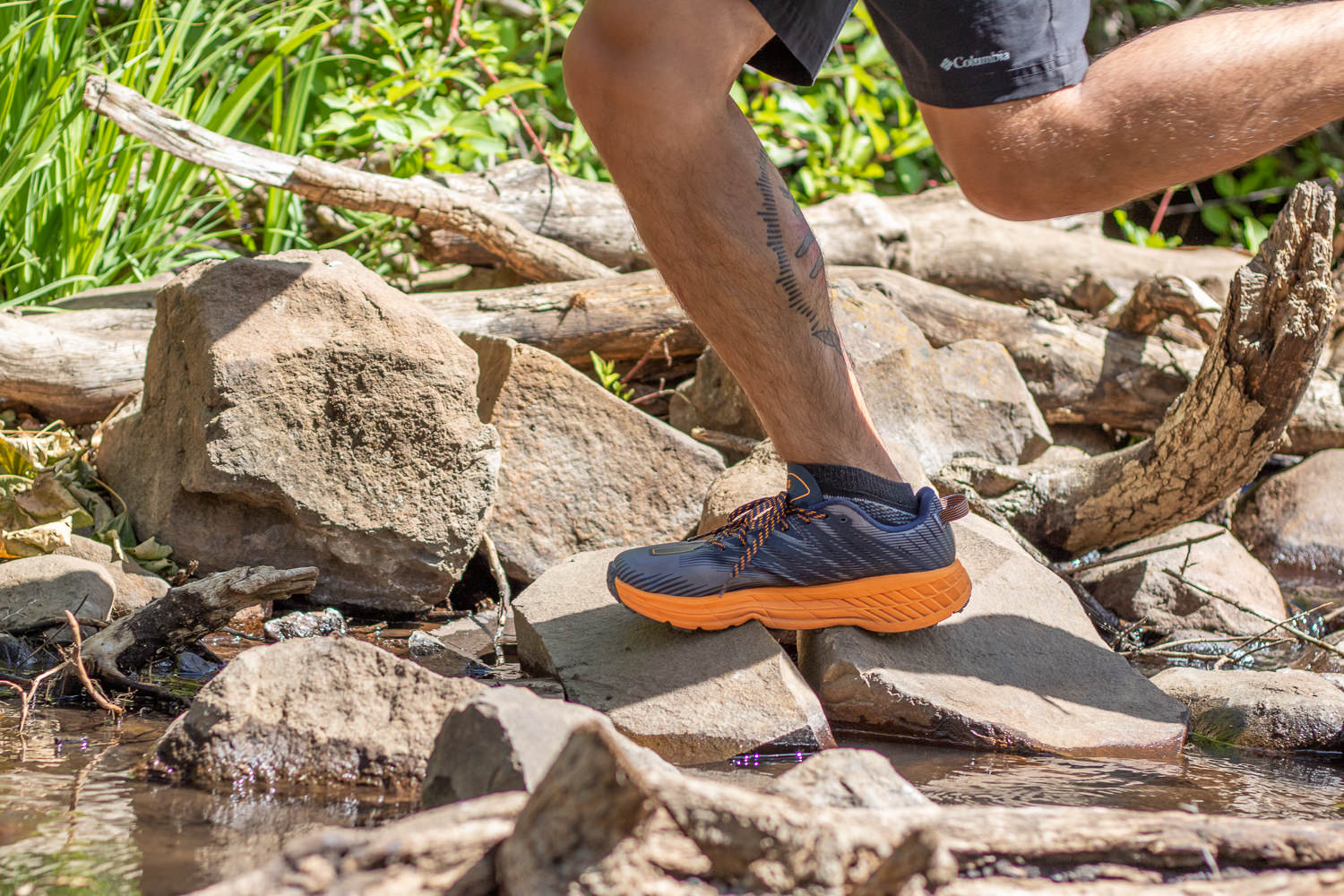
CUSHIONING & SUPPORT
An uncomfortable mountaineering shoe can destroy the day. Discovering the precise steadiness of cushioning and help will aid you focus in your hike and never your ft. Nevertheless, no mountaineering sneakers or boots will really feel wonderful out of the field. Most require a break-in interval. The stiffer and extra supportive the only real is, the longer it’ll take to melt and loosen round your foot. To search out essentially the most snug and supportive sneakers we’ve tried, check out our Prime Picks for Climbing Boots and Climbing Sneakers.
The midsole is answerable for cushioning and luxury. It absorbs shock and reduces influence in your ft to forestall points like bruising, soreness, and fatigue. With the precise degree of firmness and cushioning within the midsole, your sneakers won’t solely enhance your posture, however scale back stress throughout main joints like hips, knees, and ankles. That is tremendous essential over lengthy distances and for mountaineering on onerous surfaces. Consolation additionally means dry ft, so don’t sacrifice breathability – air flow is as essential as cushioning to remain snug.
It’s equally essential to seek out the precise footwear with sufficient ankle, arch, and heel help. With out the precise foot help, you’re vulnerable to damage, persistent ache, or points like plantar fasciitis. For those who’re involved about consolation and help, select a mountaineering shoe with a detachable footbed and use insoles that work on your particular arch peak and foot form. Heels that permit correct alignment and a very good match are additionally essential: your heels must be cupped snugly and never slipping misplaced. Lastly, think about how a lot weight you’ll be carrying on the hike. The heavier your backpack, the extra foot help you’ll seemingly want.
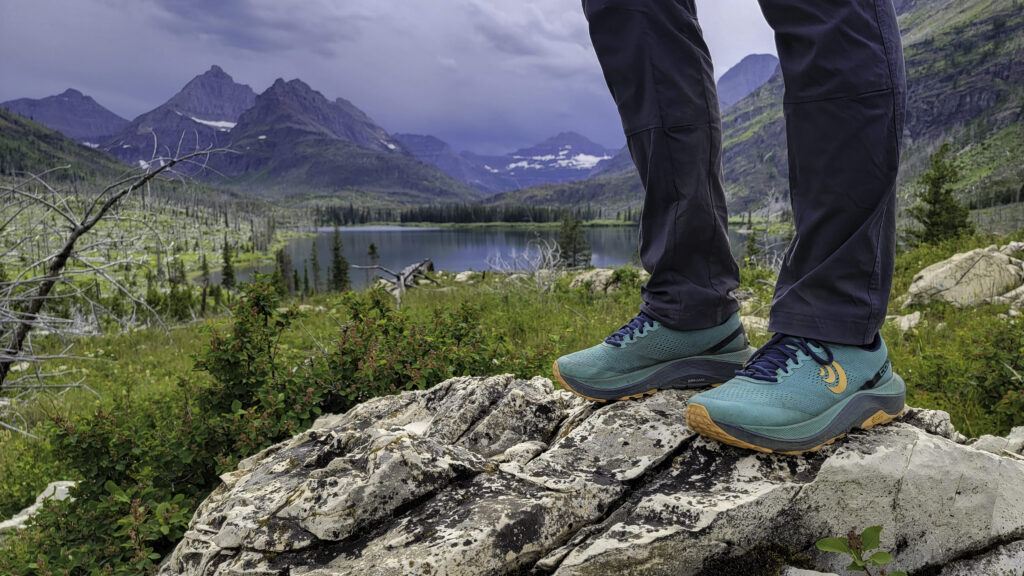
Matching Soles & Sneakers for Terrain
Matching mountaineering boot soles to particular mountaineering circumstances like terrain, climate, and route challenges could be complicated. Nevertheless, it’s essential to contemplate your surroundings while you’re in search of the precise mountaineering sneakers.
ROCKY TERRAIN
For rocky terrain, go for sturdy, semi-stiff, and supportive mountaineering sneakers with glorious traction to navigate unfastened and uneven surfaces. Vibram (or different well-built rubber soles) with aggressive, multidirectional lug patterns will provide you with a powerful grip on unpredictable, sharp rocks.
Search for extra options like toe caps, rock plates, and ankle protection for added full-foot safety. In rocky terrain, we advocate:
- Lowa Renegade GTX (Males’s / Girls’s) – The Renegades can simply deal with miles of rock. We discovered they’re succesful, versatile mountaineering boots that strike a powerful steadiness between consolation, sturdiness, and suppleness.
- Oboz Firebrand II BDry (Males’s / Girls’s) – For those who’re in search of most help, you’ve discovered it. The Firebrand is a rugged mountaineering shoe with burly traction and provides intense stability and sturdiness for cruising by way of talus fields and bumpy hikes.
- Vasque St. Elias GTX (Males’s / Girls’s) – The St. Elias makes use of a Gore-Tex liner paired with a stiff Vibram sole with a reliable lug sample. This mannequin is completely suited to rocky terrain, and its robust leather-based higher will simply deal with the sharp edges of talus and scree fields and the only real has sufficient flexibility to deal with totally different angles and floor areas.
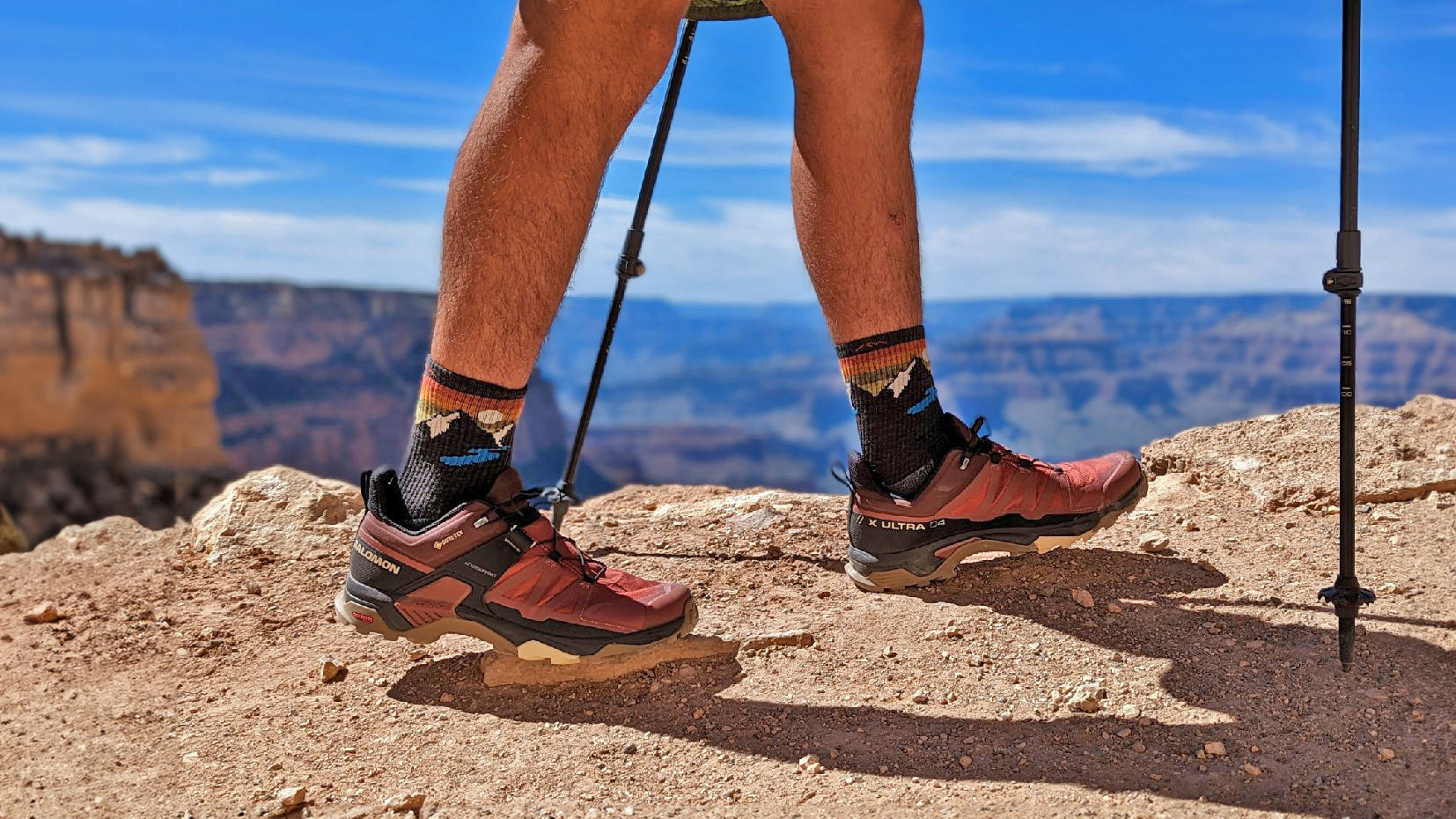
WET & MUDDY TERRAIN
Traversing damp, muck-filled trails requires not solely waterproof uppers and slip-resistant outsoles however tread designs with self-cleaning lugs to shed the mess as a substitute of taking it with you. To learn the way to remain dry and protected whereas mountaineering within the rain, take a look at our 10 Ideas For Climbing And Backpacking within the Rain Information.
Medium-to-lightweight sneakers with versatile soles will aid you stick with slimy rock and transfer by way of the mire. Search for extra options like a better ankle peak and a gusseted tongue to lock out moisture and particles. For moist, muddy terrain, we advocate:
- KEEN Targhee IV WP (Males’s / Girls’s) – They’re waterproof, and have sloped lugs for quick motion and dependable strolling on slick surfaces. The marginally versatile outsole reveals these boots are made for mushy trails.
- Salomon Quest 4 GTX (Males’s / Girls’s) – Because of the Contagrip outsole, supportive building, and waterproof lining, the Quest 4 will preserve you dry and cozy whereas pushing by way of puddles.
- La Sportiva Spire GTX (Males’s / Girls’s) – The Spire is the proper mix of mountaineering boots and path runners, providing all of the reliability of a lug-heavy sole that sheds water and dirt simply with a ventilated, tall mesh higher that retains you nimble.
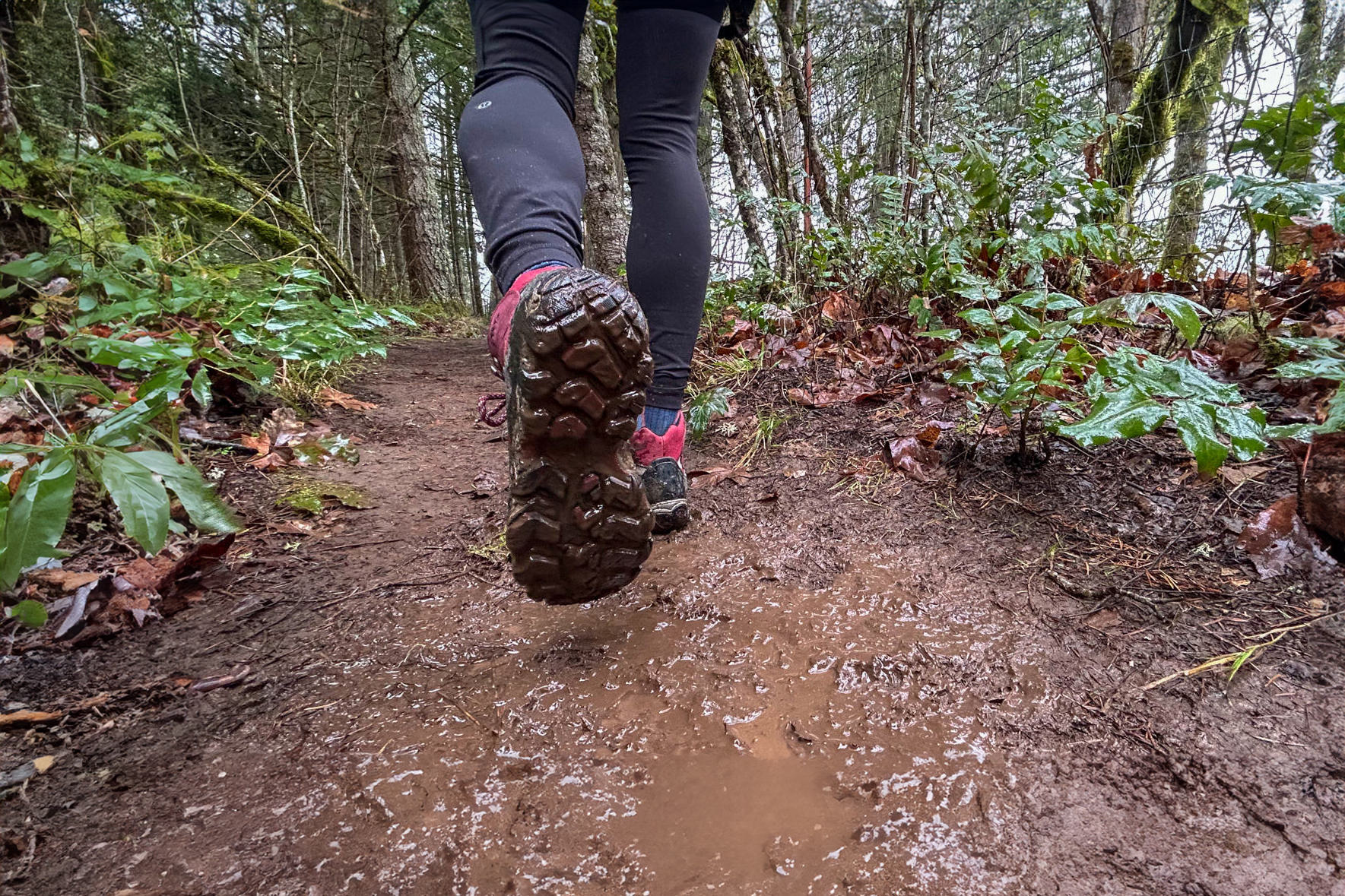
SNOWY TERRAIN
While you’re headed into the frozen tundra of winter, the primary precedence is insulated and waterproof boots with environment friendly traction – heat, dry ft are essential. Stiff boots with insulated midsoles and aggressive, deep lug patterns are key to offering grip on snow and ice.
For particularly snowy circumstances, think about including traction units like microspikes to your winter equipment. Try our Greatest Traction Gadgets listing for a few of our favorites.
Moreover, search for boots that make your ft really feel supported regardless of how mushy the bottom is. For icy, snowy hikes, we advocate:
- Merrell Thermo Chill Mid (Girls’s) – A fleece lining, stellar help, and a inflexible sole will preserve you heat for many winter actions.
- Columbia Fairbanks (Males’s) / Minx Shorty (Girls’s) – With efficient insulation, a water-proof however breathable layer, and luxury that extends previous your ankles, these boots will guarantee safe footing on winter trails or slippery sidewalks.
- Salomon X Extremely Mid Winter (Girls’s) – We just like the aggressive tread on this shoe. It might deal with nearly any winter mountaineering journey. Plus, the nice match, cheaper price tag, and top quality are onerous to beat.
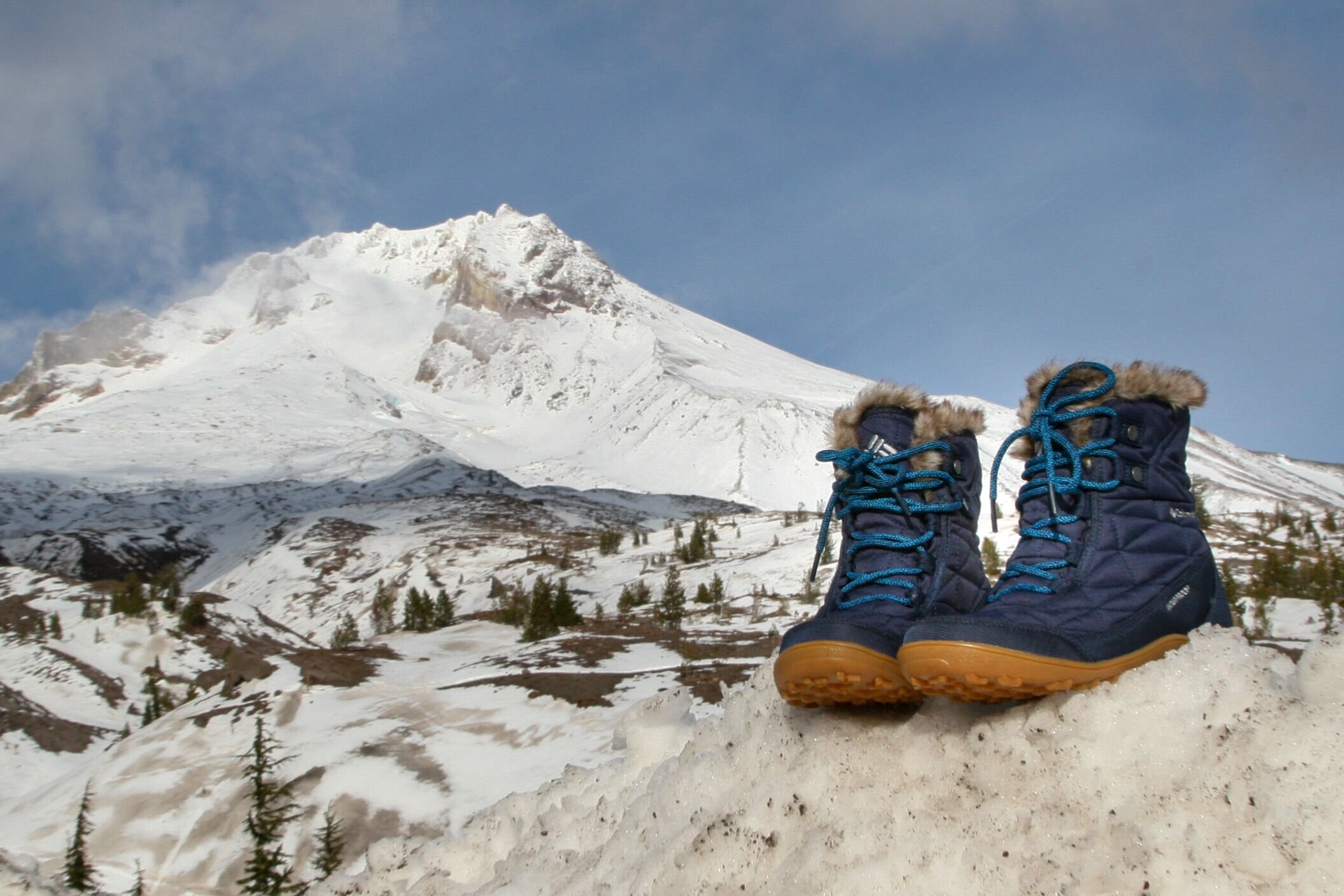
DESERT, SAND & ARID TERRAIN
The perfect footwear for toasty environments is constructed with light-weight supplies to assist with temperature administration. Sandy, dry environments require softer, versatile outsoles sturdy sufficient to deal with grime, unfastened gravel, and massive rocks. Search for soles with extra foam content material and fewer rubber composite to maximise air flow. They need to additionally supply a tread sample that sheds particles simply.
Search for sneakers with breathable uppers to maximise airflow when it’s sizzling. For sweaty, arid hikes, we advocate:
- HOKA Speedgoat 5 (Males’s / Girls’s) – These are a prime performer on our listing of the greatest mountaineering sneakers. The soft midsole and tremendous breathable supplies, mixed with their sturdy, mesh-free uppers make them a stellar and versatile match for desert hikes.
- Topo Athletic Ultraventure 3 (Males’s / Girls’s) – For lengthy walks in excessive, dry temperatures, the Ultraventures are a powerful light-weight mountaineering possibility with a large toe field to actually let your ft breathe.
- Chaco Z/1 Basic and Chaco Z/Cloud (Males’s / Girls’s) – Climbing in sandals has grown in reputation, and a few hikers even favor them for multi-day treks and massive mileage days. Although this model of mountaineering isn’t for everybody, we agree that there are robust Execs and Cons to Backpacking in Sandals. However, if you need final air flow and don’t wish to sacrifice help or sturdiness, look no additional than a pair of Chacos.
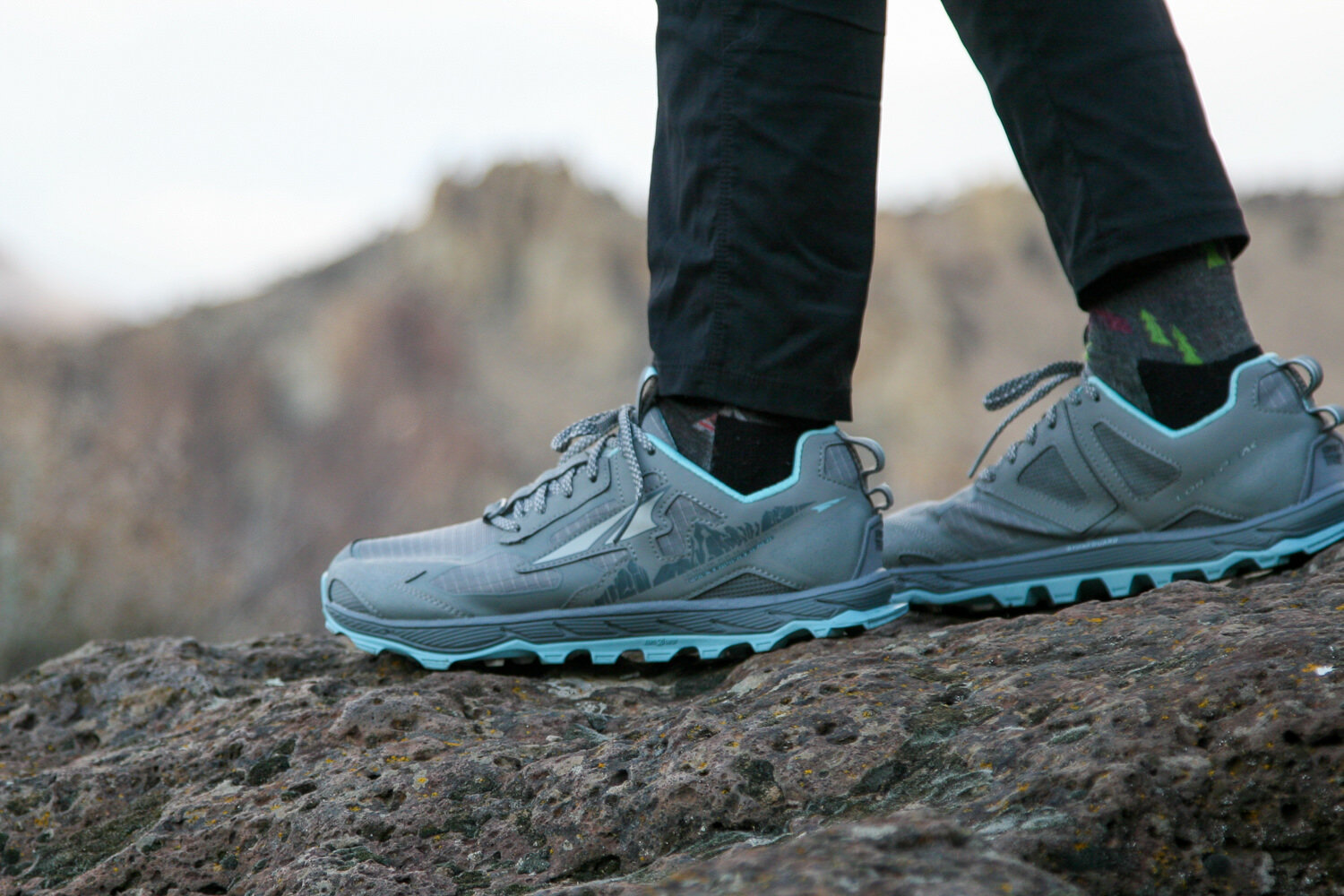
FORESTED TERRAIN
Whether or not it’s roots, rocks, uneven grime, pokey vegetation, or steep river banks, the woods are filled with obstacles. You’ll want snug, versatile mountaineering boots with medium to aggressive tread patterns. The midsoles could be mushy to reasonably stiff, so long as the outsole is grippy.
Search for extra protecting options like waterproof uppers and ankle help. For hikes by way of the forest, we advocate:
- La Sportiva Nucleo Excessive II GTX (Males’s / Girls’s) – At barely 2.5 kilos, the Nucleo Excessive II is a light-weight however beefy boot that may deal with any challenges forest trails may current.
- Merrell Moab 3 (Males’s / Girls’s) – Positive, these boots run heavier and bulkier than the above choices, however they’re extremely snug, sturdy, and breathable. Generally, sturdy help and substantial cushioning are all you want for a pleasing hike by way of the backwoods.
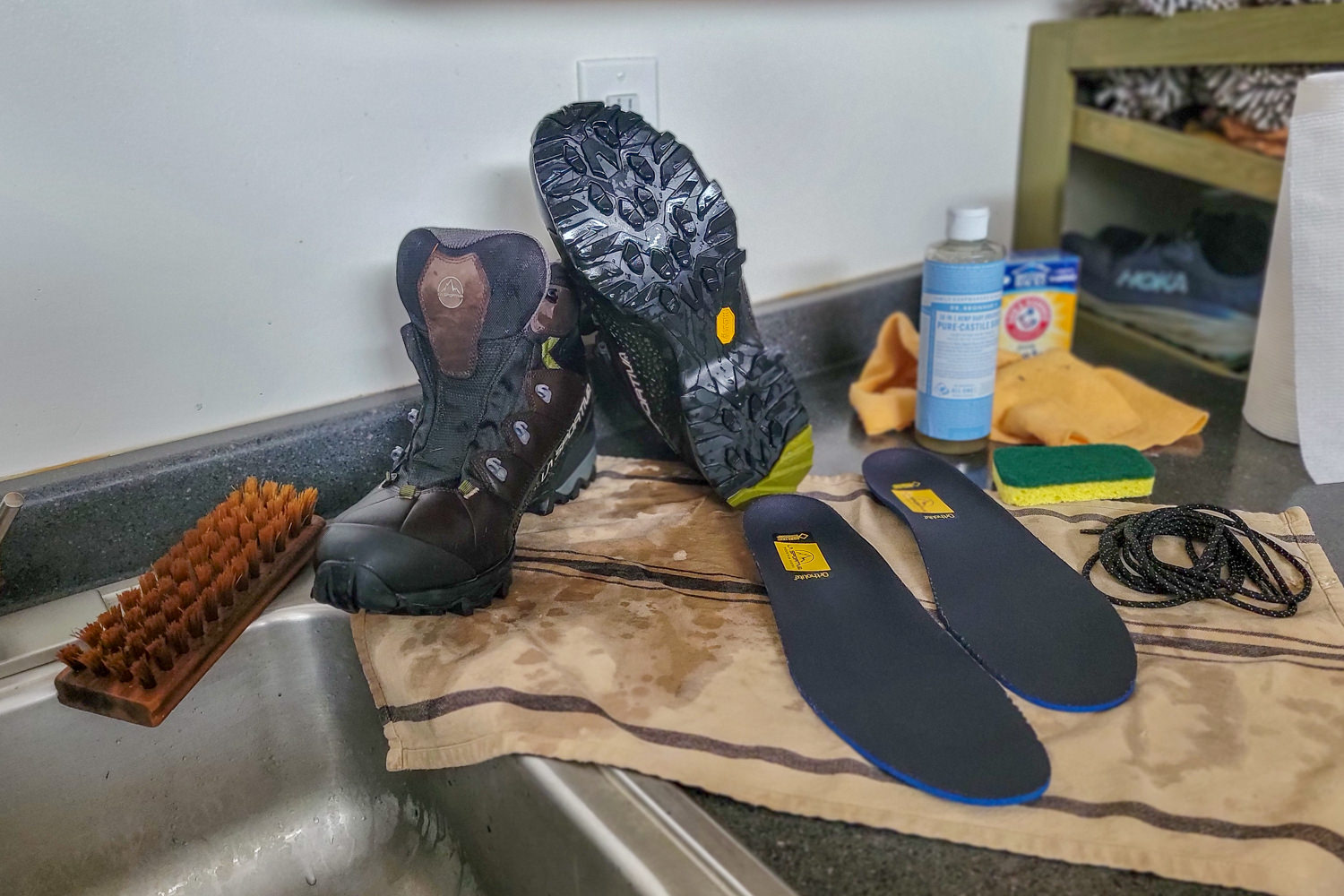
Ideas for Sustaining Climbing Boots
CLEANING & MAINTENANCE
The largest cause to maintain your mountaineering sneakers clear is to elongate the lifetime of your footwear. By repeatedly eradicating grime and dirt, you too can stop micro organism buildup and forestall funky odors – nobody likes pungent sneakers in the home. A bit of scheduled upkeep on your favourite boots goes a good distance to make sure they continue to be practical and cozy on your subsequent hike.
- Harm management – About as soon as a month, we advocate inspecting sneakers and soles for indicators of serious put on, harm, or separation from the uppers. We’ve discovered that even essentially the most innocuous hike could cause surprising harm to your sneakers, and common inspection can stop additional harm from roots and rocks. For holes and tears on and across the soles of the sneakers, we advocate a long-lasting sealant gel like Gear Assist Aquaseal SR. For boot cloth in want of additional waterproofing, we advocate a repellent spray like Nikwax Material & Leather-based Proofing Spray. For particularly worn tread, don’t exchange, resole. Many manufacturers supply quick, inexpensive, and spectacular resoling providers, a terrific possibility if the higher remains to be in good condition.
- Common cleansing – Dust, sand, and particles wedged into your mountaineering shoe can accumulate over time. These particles will finally break down the fabric of the shoe and tread. We advocate cleansing your boots after each hike. For particularly filthy instances, use a hose or robust water spray to douse the shoe and clear giant messes. The remainder of the time, a mushy brush or material is all it takes to take away grime, mud, and particles from the soles and higher of the shoe.
- Deep cleansing – We advocate deep cleansing your sneakers as soon as a month for heavy use throughout mountaineering season or as soon as per season for infrequent use. First, take away the insoles and laces, then scrub the soles and higher with heat water and a footwear-specific cleansing gel like Nikwax Footwear Cleansing Gel. Grangers Footwear Cleansing Package additionally works nicely. By no means use harsh chemical substances or solvents since they will destroy the shoe supplies and even dissolve adhesives. Air dry all the best way earlier than storing.
- Waterproofing – The higher of your waterproof boots will must be refreshed periodically. Sustaining this exterior materials is essential to maintain your favourite pair of shoes wholesome, robust, and practical. For those who’re repeatedly utilizing your boots, it’s possible you’ll have to waterproof them a number of instances in a season. For infrequent use, it’s possible you’ll discover that extra waterproofing is just wanted as soon as a season. In case your sneakers are leather-based or suede, think about including a top quality leather-based conditioning possibility like Nikwax Liquid Conditioner For Leather-based. For each artificial and leather-based choices, a layer of waterproofing spray like Nikwax Material and Leather-based Waterproofing Spray can dramatically lengthen the lifetime of your boots with out affecting the aesthetic of the boot end.
- Thorough drying – Drying is the simplest half: go away your boots in your own home at room temperature. That’s it. Although an intensive wash will solely take 10 to twenty minutes, there’s no dashing the drying course of. You possibly can stuff bunched paper towels into the boots to soak up extra moisture or set them up in entrance of a fan to maintain the air shifting, however we advocate budgeting 1 to three days on your sneakers to fully dry out. By no means use extra, direct warmth sources like heaters or daylight, since warmth harm can wreak havoc on the mountaineering boot materials.
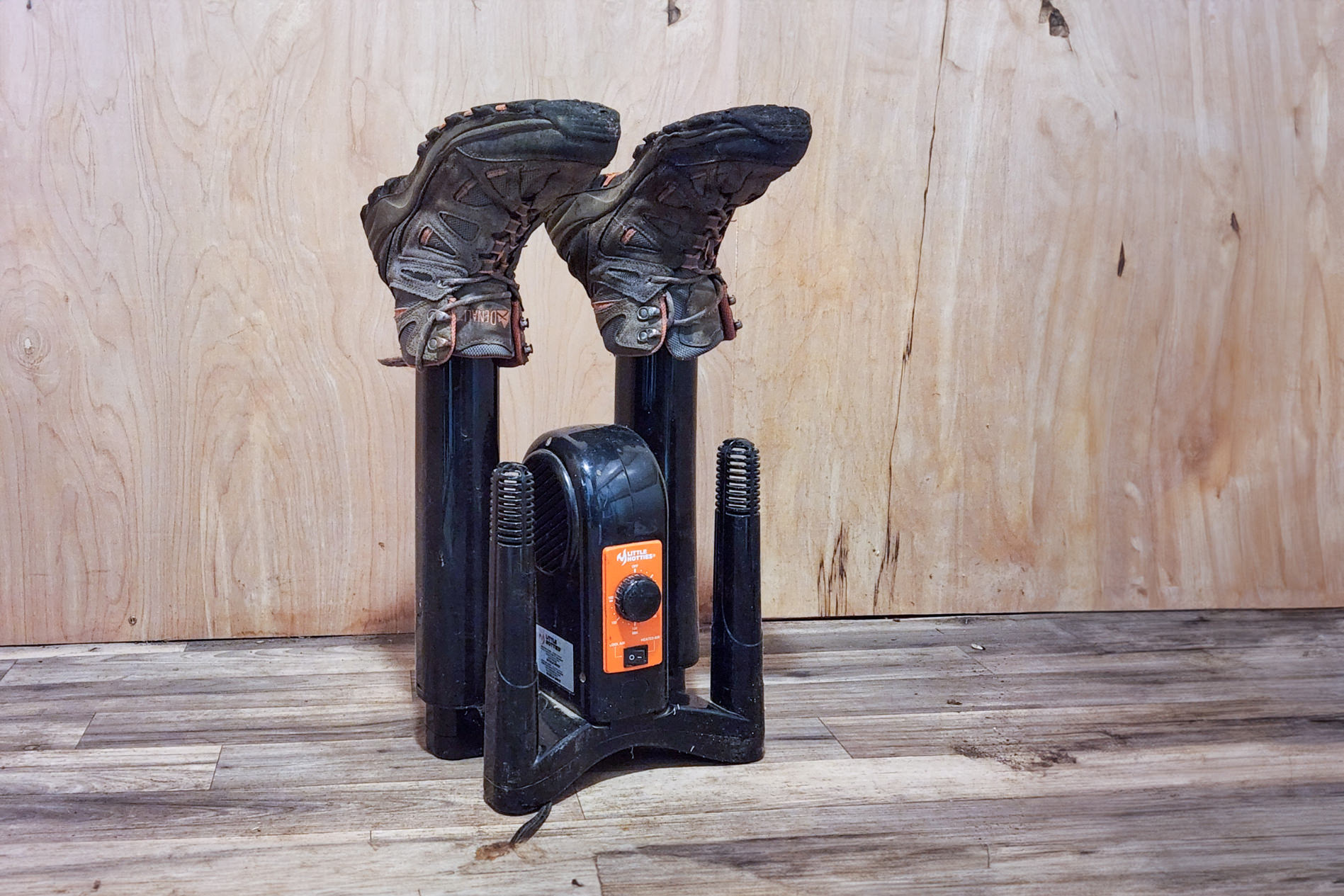
STORAGE TIPS
Climbing shoe storage is essential to preserving your favourite sneakers crisp and prepared on your subsequent journey.
- Cool and dry – Over time, direct daylight and excessive temperatures will weaken adhesives, compromise materials, and deteriorate rubber compounds. Maintain your mountaineering boots in a cool, dry place like a closet or shoe rack. If pests like rodents or bugs are a problem the place you reside, think about storing sneakers in a plastic bag for just a little further safety – however by no means a vacuum or compression sack.
- Compression is dangerous – Boots saved with heavy objects on prime, or in a pile with different footwear, will lose their form. Compression will finally wreck the integrity of the supplies. Your boot was seemingly compressed if it has a smashed or lopsided look, doesn’t return to its preliminary form, or doesn’t match the way it as soon as did. We advocate storing boots in an upright and open place and in a devoted place in your own home. For those who’re involved about your shoe shedding form, think about using cheap shoe shapers to forestall your favourite hikers from turning into misshapen throughout storage.
- Air is nice – Moisture buildup is your mountaineering boots’ enemy. Keep away from storing boots in damp garages, sheds, or crawlspaces. To maximise air flow of the boot when not in use, take away insoles, loosen boot laces, and open the tongue so there’s airflow across the shoe.
Backside Line
Choosing the proper mountaineering boot sole is essential while you’re purchasing on your subsequent mountaineering boot. The development of the insole, midsole, and outsole supplies work collectively and instantly influence your consolation, security, and total expertise whereas mountaineering.
Totally different terrains demand particular sole sorts. Take note of options like breathability, waterproofing, help, cushioning, lug sample, and insulation primarily based on the place you’re going. Make sure to select a mountaineering shoe from a good sole producer that will provide you with the precise grip and traction in numerous circumstances.
Whether or not you’re tackling rocky trails, sandy routes, moist and muddy terrain, snowy peaks, or the deep woods, a shoe sole that helps you thrive whereas mountaineering isn’t simply nice on your physique – it’s peace of thoughts.

